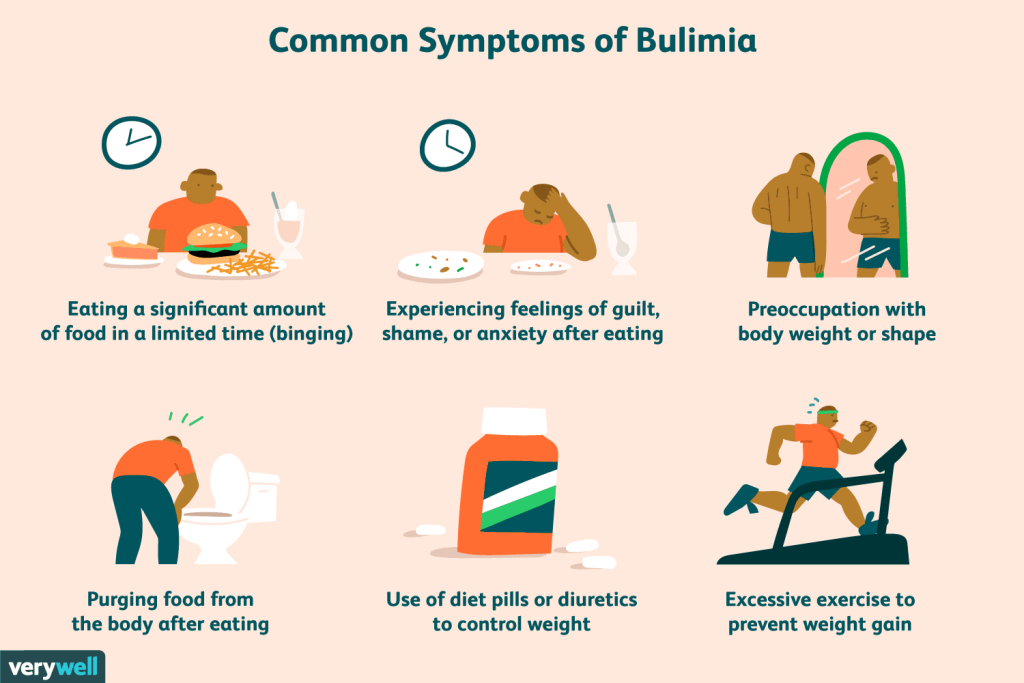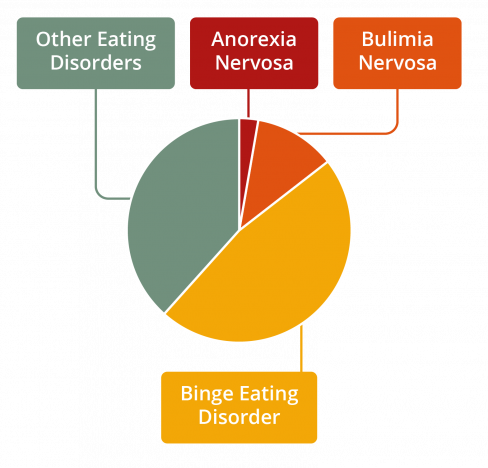Bulimia Nervosa is one of the most common psychological disorders. Today, besides physical diseases, there are also psychological diseases that we fall into spiritually. These diseases often become so serious that they begin to threaten a person’s health. Personality disorders, depression, and then there are health problems that affect people’s eating patterns. One of them is Bulimia Nervosa. So what is Bulimia Nervosa and How to Treat it, let’s find out together.
- What is Bulimia Nervosa Disease?
- What are Examples of Bulimia Nervosa?
- What is the Outlook for People with Bulimia Nervosa?
- What is Bulimia Nervosa Characterized by?
- Who Gets Bulimia Nervosa?
- What Are the Symptoms of Bulimia Nervosa?
- What Causes Bulimia Nervosa?
- Why Do People Develop Bulimia?
- When Should I Seek Help?
- What Is the Difference Between Anorexia Nervosa and Bulimia Nervosa?
- How is Bulimia Nervosa Diagnosed?
- The Risk Factors of Bulimia
- How is Bulimia Nervosa Treated?
- Helping a Person Who Has Bulimia Symptoms
- What are the Harms of Bulimia Nervosa?
- Bulimia Nervosa Treatment Prices in Turkey
- What Are the Complications of Bulimia?
- Conclusion
- Why do bulimics drink milk?
- What trait is common among people with bulimia nervosa?
What is Bulimia Nervosa Disease?
Bulimia Nervosa is an eating disorder. It is also commonly known as vomiting disease among the people. In short, people experience sudden eating attacks for a number of reasons. A person who eats foods that have more amount and calories than he/she can eat in a short time at once feels regret and resorts to forced vomiting.
They try to do everything that they think will lose weight after the attacks of eating psychologically, such as diarrhea drugs, weight loss pills, enemas, and some drugs. In some cases, they exercise more than necessary to create a calorie deficit. The question of what is Bulimia Nervosa Disease can be briefly explained in this way.
This disease is a disease with serious side effects and complications if not taken care of and treated. Anyone who likes to eat in general thinks they have Bulimia Nervosa when they experience binge eating. But in order for this to happen, he must experience it at least once a week and then have the desire to leave with guilt.

What are Examples of Bulimia Nervosa?
Bulimia nervosa is a serious eating disorder characterized by binge eating followed by purging behaviors. People with bulimia often have an intense fear of gaining weight and a distorted body image. They may feel out of control during binge episodes and then engage in purging behaviors to compensate for the calories they’ve consumed.
Purging behaviors can include self-induced vomiting, excessive exercise, and misuse of laxatives or diuretics. People with bulimia may also restrict their food intake between binges.
Here are some examples of bulimia nervosa:
Eating a large amount of food in a short period of time, such as eating an entire pizza in one sitting
Feeling out of control during a binge episode, like you can’t stop eating or control what you eat
Purging after a binge episode by self-induced vomiting, excessive exercise, or misuse of laxatives or diuretics
Restricting your food intake between binges:
Having a distorted body image and an intense fear of gaining weight
It’s important to note that bulimia nervosa can vary from person to person. Some people with bulimia may binge and purge multiple times a day, while others may only do it once a week or less. Some people may have a normal or even above-average weight, while others may be underweight.
No matter how often or how severely someone binges and purges, bulimia nervosa is a serious medical condition that can lead to dangerous health complications. If you think you or someone you know may have bulimia, it’s important to seek professional help as soon as possible.
Other examples of bulimia nervosa behaviors:
In addition to the core behaviors of bulimia nervosa, there are a number of other behaviors that people with bulimia may engage in. These include:
- Eating in secret
- Hiding food or food wrappers
- Lying about how much they’ve eaten
- Avoiding social situations where food is present
- Wearing loose-fitting clothing to hide their body shape
- Checking their weight and body measurements frequently
- Comparing themselves to others
- Feeling guilty or ashamed about their eating habits
- How to get help with bulimia nervosa
If you think you or someone you know may have bulimia nervosa, it’s important to seek professional help as soon as possible. A qualified mental health professional can help you develop a treatment plan that is right for you.
Treatment for bulimia nervosa typically includes a combination of psychotherapy and medication. Psychotherapy can help you to understand and address the underlying causes of your bulimia, while medication can help to treat any co-occurring conditions, such as depression or anxiety.
Recovery from bulimia nervosa is possible, but it takes time and effort. With the right support, you can learn to manage your bulimia and live a healthy and fulfilling life.

What is the Outlook for People with Bulimia Nervosa?
The outlook for people with bulimia nervosa is generally positive. With treatment, most people with bulimia can make a full recovery. However, recovery can be challenging and may take time and effort.
There are a number of factors that can affect the prognosis for people with bulimia, including:
The severity of the disorder: People with more severe bulimia may take longer to recover.
The duration of the disorder: The longer someone has bulimia, the more difficult it may be to recover.
The presence of other mental health disorders: People with bulimia often have other mental health disorders, such as depression or anxiety. These disorders can make it more difficult to recover from bulimia.
Access to treatment: People who have access to high-quality treatment are more likely to make a full recovery from bulimia.
What is Bulimia Nervosa Characterized by?
Binge eating is defined as eating, in a discrete period of time (e.g., within any 2-hour period), an amount of food that is definitely larger than most people would eat during a similar period of time and under similar circumstances. Individuals with bulimia typically experience a feeling of loss of control during binge eating episodes.
Compensatory behaviors are used to prevent weight gain after binge eating and may include self-induced vomiting, excessive exercise, misuse of laxatives or diuretics, or fasting.
Other characteristics of bulimia nervosa include:
- An intense fear of gaining weight or becoming fat
- A distorted body image, often seeing oneself as fat even though one is underweight or normal weight
- Frequent fluctuations in weight
- Preoccupation with food and weight
- Secrecy about one’s eating habits
- Guilt, shame, and anxiety related to eating
Bulimia nervosa can have serious health consequences, including:
- Dehydration
- Electrolyte imbalances
- Heart problems
- Stomach problems
- Esophageal damage
- Tooth decay
- Bone loss
- Menstrual irregularities
- Seizures
- Death

Who Gets Bulimia Nervosa?
- In people whose self-confidence is not high enough
- In depressed people
- In people with extreme anxiety problems
- People who have completely embedded the thought that it is very beautiful to be thin
- People who have experienced mental and physical abuse during their childhood
- In people who were very obese as a child
- In people who entered puberty earlier than normal
- In people with an overly intrusive attitude of the parent
- In people with an extremely inadequate attitude toward the parent
What Are the Symptoms of Bulimia Nervosa?
Symptoms that occur in physical diseases also occur in psychological diseases. What are the Symptoms of Bulimia Nervosa, we can briefly explain as follows:
- Eating more than usual in one sitting
- Forced vomiting after eating
- The use of drugs for weight loss
- Fear of gaining weight
- Perceiving himself as fat even though he is thin
- Yellowing of the teeth due to constant vomiting
- Desire to be alone while eating
- Prefer asocial life
- Unaware of his illness
- A sudden change of mood
- Depression symptoms
- Excessive exercise
- The occurrence of fatigue
- Oral health deterioration
- Pain in the throat due to vomiting
- Digestive system problems
- Russell formation, that is, the formation of calluses in the joints of the fingers

What Causes Bulimia Nervosa?
A clear cause of Bulimia Nervosa has not been found yet. However, women are more likely to suffer from this ailment. One of the underlying reasons is the understanding of beauty in a certain pattern, which is tried to be imposed on people.
In general terms; What are the Causes of Bulimia Nervosa, we can briefly explain as follows:
- Genetic predisposition. Having an eating disorder in the family or relatives.
- Being overweight as a child.
- Depression.
- Anxiety disorder.
- Psychological problems.
- Go on a diet.
Why Do People Develop Bulimia?
Bulimia nervosa is a serious eating disorder characterized by recurrent episodes of binge eating followed by compensatory behaviors to prevent weight gain. It is a complex condition with many contributing factors, including:
- Genetics: Bulimia can run in families, suggesting that there may be a genetic component to the disorder.
- Brain chemistry: People with bulimia may have imbalances in certain brain chemicals that regulate appetite and mood.
- Personality traits: People with bulimia are often perfectionistic, have low self-esteem, and have difficulty coping with stress.
- Social and cultural factors: The pressure to be thin and the unrealistic body image ideals portrayed in the media and in society can contribute to the development of bulimia.
- Life experiences: Traumatic experiences, such as physical or sexual abuse, or the death of a loved one, can increase the risk of developing bulimia.
It is important to note that not everyone who experiences these risk factors will develop bulimia. The exact cause of bulimia is unknown, and it is likely that a combination of factors contributes to its development.
Here is a more detailed look at some of the risk factors for bulimia:
Genetics: Studies have shown that people with a first-degree relative (parent, sibling, or child) with an eating disorder are more likely to develop an eating disorder themselves. This suggests that there may be a genetic component to bulimia.
Brain chemistry: People with bulimia may have imbalances in certain brain chemicals that regulate appetite and mood. For example, people with bulimia often have low levels of serotonin, a neurotransmitter that plays a role in mood regulation.
Personality traits: People with bulimia are often perfectionistic, have low self-esteem, and have difficulty coping with stress. These personality traits can make people more vulnerable to developing bulimia.
Social and cultural factors: The pressure to be thin and the unrealistic body image ideals portrayed in the media and in society can contribute to the development of bulimia. People who are constantly bombarded with images of thin and perfect people may feel pressure to conform to these ideals. This can lead to feelings of inadequacy and low self-esteem, which can increase the risk of developing bulimia.
Life experiences: Traumatic experiences, such as physical or sexual abuse, or the death of a loved one, can increase the risk of developing bulimia. These experiences can lead to emotional distress and unhealthy coping mechanisms, such as bulimia.

When Should I Seek Help?
- If your bulimia is interfering with your daily life, such as your relationships, work, or school
- If you are losing weight rapidly
- If you are having difficulty eating or keeping food down
- If you are experiencing purging behaviors more than once a week
- If you are having thoughts of suicide or self-harm
What Is the Difference Between Anorexia Nervosa and Bulimia Nervosa?
Anorexia nervosa and bulimia nervosa are both serious eating disorders that can have serious health consequences. However, there are some key differences between the two disorders.
Anorexia nervosa is characterized by an intense fear of gaining weight and a distorted body image. People with anorexia often restrict their food intake to the point of starvation. They may also engage in excessive exercise and purging behaviors, such as self-induced vomiting or misuse of laxatives or diuretics.
Bulimia nervosa is also characterized by an intense fear of gaining weight and a distorted body image. However, people with bulimia typically engage in cycles of binge eating followed by compensatory behaviors to prevent weight gain.
Binge eating episodes are characterized by eating an excessive amount of food in a short period of time, often feeling out of control during the binge. Compensatory behaviors may include self-induced vomiting, excessive exercise, misuse of laxatives or diuretics, or fasting.
Here is a table that summarizes the key differences between anorexia nervosa and bulimia nervosa:
| Characteristic | Anorexia nervosa | Bulimia nervosa |
|---|---|---|
| Weight | Typically underweight | May be underweight, normal weight, or overweight |
| Eating habits | Restricts food intake severely | Cycles of binge eating and compensatory behaviors |
| Body image | Distorted body image, seeing oneself as fat even though one is underweight or normal weight | Distorted body image, seeing oneself as fat even though one is underweight, normal weight, or overweight |
| Other symptoms | May experience fatigue, dizziness, cold intolerance, amenorrhea, and other health problems | Maybe underweight, normal weight, or overweight |
How is Bulimia Nervosa Diagnosed?
Bulimia Nervosa is a serious eating disorder. In some cases, they were treated in hospital for extreme weight loss. For this reason, people should know their bodies and themselves well before starting the diagnosis and treatment process.
In addition, in order to start this process, he/she must realize the situation he/she is in and see that he/she needs help. In this disease, treatment will not progress positively unless the person wants it.
How to Diagnose Bulimia Nervosa If we need to explain briefly, first of all, the eating disorder of the person should occur at least once a week and spread over a long period of three months. In other words, the person should have binge eating attacks at least once a week and then take some steps to compensate for this.
After the occurrence of such symptoms, the person is physically examined. Some blood tests are done. In addition, the diagnosis is made after being subjected to a number of psychological tests for eating and body image by psychiatry.

The Risk Factors of Bulimia
Bulimia nervosa is a serious eating disorder characterized by recurrent episodes of binge eating followed by compensatory behaviors to prevent weight gain. It is a complex condition with many contributing factors, including:
- Genetics: Bulimia can run in families, suggesting that there may be a genetic component to the disorder.
- Brain chemistry: People with bulimia may have imbalances in certain brain chemicals that regulate appetite and mood.
- Personality traits: People with bulimia are often perfectionistic, have low self-esteem, and have difficulty coping with stress.
- Social and cultural factors: The pressure to be thin and the unrealistic body image ideals portrayed in the media and in society can contribute to the development of bulimia.
- Life experiences: Traumatic experiences, such as physical or sexual abuse, or the death of a loved one, can increase the risk of developing bulimia.
Here is a more detailed look at some of the risk factors for bulimia:
- Genetics: Studies have shown that people with a first-degree relative (parent, sibling, or child) with an eating disorder are more likely to develop an eating disorder themselves. This suggests that there may be a genetic component to bulimia.
- Brain chemistry: People with bulimia may have imbalances in certain brain chemicals that regulate appetite and mood. For example, people with bulimia often have low levels of serotonin, a neurotransmitter that plays a role in mood regulation.
- Personality traits: People with bulimia are often perfectionistic, have low self-esteem, and have difficulty coping with stress. These personality traits can make people more vulnerable to developing bulimia.
- Social and cultural factors: The pressure to be thin and the unrealistic body image ideals portrayed in the media and in society can contribute to the development of bulimia. People who are constantly bombarded with images of thin and perfect people may feel pressure to conform to these ideals. This can lead to feelings of inadequacy and low self-esteem, which can increase the risk of developing bulimia.
- Life experiences: Traumatic experiences, such as physical or sexual abuse, or the death of a loved one, can increase the risk of developing bulimia. These experiences can lead to emotional distress and unhealthy coping mechanisms, such as bulimia.
How is Bulimia Nervosa Treated?
How to Treat Bulimia Nervosa If we need to explain briefly, the first known and most widely used method is psychotherapy. For this method to work, the patient must also want the treatment. In addition, the involvement of the family in the treatment can accelerate the treatment process.
However, some antidepressant drugs can also be used. People can be given information and education about making healthy eating a lifestyle. In the process, a healthy diet can be made. If the signs and symptoms are advanced, the treatment process can be continued by hospitalization.
Helping a Person Who Has Bulimia Symptoms
If you think someone you know may have bulimia nervosa, it is important to offer your support and encouragement. This is a serious eating disorder that can have serious health consequences, but it is possible to recover.
Here are some tips on how to help someone with bulimia symptoms:
- Talk to them about your concerns: Choose a time and place where you can talk privately and without distractions. Be honest and direct about your concerns, but avoid being judgmental or accusatory.
- Listen without judgment: Once you have expressed your concerns, listen to what the person has to say. Try to understand their perspective and why they may be engaging in bulimic behaviors.
- Encourage them to seek professional help: Let them know that you are there to support them and that you will help them find the help they need. There are many resources available to help people with bulimia, including therapy, support groups, and medication.
- Be patient and supportive: Recovery from bulimia takes time and effort. Be patient with the person you are supporting and offer them your encouragement and support.
Here are some specific things you can do to help someone with bulimia symptoms:
- Encourage them to eat regular meals and snacks. This will help to stabilize their blood sugar levels and reduce the urge to binge eat.
- Help them to create a healthy meal plan. This should include a variety of nutrient-rich foods.
- Help them to avoid trigger foods. These are foods that make them want to binge eat.
- Encourage them to be active in a healthy way. Exercise can help to improve mood and reduce stress, which can be helpful for people with bulimia.
- Be there for them to talk to. Let them know that you are there to listen and offer support.
If you are concerned about someone’s safety, such as if they are engaging in dangerous purging behaviors or are losing weight rapidly, it is important to seek professional help immediately.
Here are some additional tips for helping a person with bulimia symptoms:
Educate yourself about bulimia: The more you know about the disorder, the better equipped you will be to help.
Be supportive and understanding: Recovery from bulimia can be a long and difficult process. Be there for the person you are supporting and offer them your encouragement and patience.
Respect their boundaries: Don’t try to force them to do anything they are not ready for.
Take care of yourself: It is important to take care of yourself emotionally and physically when you are supporting someone with an eating disorder. Make sure to get enough sleep, eat healthy foods, and exercise regularly.

What are the Harms of Bulimia Nervosa?
Removing the nutrients that a person consciously and voluntarily eats from the body brings with it a number of harms. So what are the Harms of Bulimia Nervosa, let’s examine them together.
- Irritation of the esophagus may occur
- A rupture may occur in the esophagus
- It can be reflux
- Bloating may occur
- Intestinal damage may occur
- Diarrhea and constipation may occur
- There may be calluses on the hands
- Fluid loss may occur
- Heart weakness may occur
- Heart failure may occur
- Anemia may occur
- blood pressure may drop
- The pulse may begin to beat weakly
- Tearing and damage to blood vessels may occur
- Depression can occur
- Anxiety can occur
- Obsession may occur
- Menstrual interruption may occur
Bulimia Nervosa Treatment Prices in Turkey
In addition to the treatment of physical diseases, Turkey also treats psychological diseases. Investments made in the field of health have allowed progress in both physical and psychological fields. The completion of the treatments with a high success rate did not escape the attention of foreign citizens. For this reason, foreigners who prefer Turkey for treatment rather than their own country have led to an increase in health tourism.
The hospitals are large and fully equipped, the doctors are experts and experienced in their field, the diagnosis and treatment process is based on scientific data and technological devices, the Turkish people are hospitable and friendly, the needs such as diagnosis, treatment, eating, drinking and sheltering are met at affordable prices.
Factors such as these are also shown among other reasons for preference. Before coming to Turkey for treatment, we can see that foreign citizens do research on Bulimia Nervosa Treatment Prices in Turkey. However, it is not correct to give clear price information at this stage just to satisfy their curiosity. It should not be forgotten that each disease is personal and each patient fights the disease in his own way.
For this reason, many factors such as the duration of treatment, the duration of diagnosis, the treatment, and diagnostic methods to be used directly affect the price issue. You can contact us for more detailed treatment information and net price information. In addition, if you come to Turkey for the treatment of Bulimia Nervosa through us, we can facilitate your visa procedures with the invitation letter sent by us to the consulate.
What Are the Complications of Bulimia?
- Dehydration and electrolyte imbalances: Purging behaviors can lead to dehydration and electrolyte imbalances, which can be dangerous and even life-threatening.
- Heart problems: Bulimia can damage the heart muscle and increase the risk of heart arrhythmias and heart failure.
- Digestive problems: Bulimia can damage the digestive system, causing problems such as acid reflux, gastritis, and constipation.
- Dental problems: Purging behaviors can damage the teeth and gums, leading to cavities, tooth decay, and gum disease.
- Bone loss: Bulimia can lead to bone loss, increasing the risk of osteoporosis and fractures.
- Menstrual irregularities: Bulimia can disrupt menstruation, causing amenorrhea (lack of menstruation), irregular periods, or heavy bleeding.
- Nutrient deficiencies: Bulimia can lead to nutrient deficiencies, which can cause a variety of health problems, such as fatigue, weakness, anemia, and impaired immune function.
- Psychological problems: Bulimia can also lead to psychological problems, such as depression, anxiety, and obsessive-compulsive disorder.
Conclusion
In conclusion, bulimia nervosa is a serious psychological disorder that needs to be treated. In this disease, people resort to some drugs, laxatives and enemas after eating suddenly and in a short time. The most common is to make himself vomit again. If not diagnosed and treated early, it can cause serious complications.
At this point, our aim is to bring the doctor and the patient together for the treatment of the disease, to ensure the smooth progress of the diagnosis and treatment process, and to help the patient return home in a healthy way after recovery. You can contact us for detailed information.
Why do bulimics drink milk?
To purge: Milk can be a trigger food for some people with bulimia, and drinking it can lead to a binge eating episode followed by purging behaviors such as self-induced vomiting or excessive exercise.
To neutralize stomach acid: Purging behaviors can lead to acid reflux and heartburn. Some people with bulimia may drink milk to neutralize stomach acid and relieve these symptoms.
To feel full: Milk is a high-calorie food that can help people with bulimia to feel full. This may be especially helpful for people who are restricting their food intake.
To soothe the throat: Purging behaviors can irritate the throat. Some people with bulimia may drink milk to soothe their throat and relieve pain.
What trait is common among people with bulimia nervosa?
A common trait among people with bulimia nervosa is perfectionism. People with bulimia often have unrealistic expectations of themselves and others, and they may feel pressure to be perfect in all areas of their lives. This pressure can lead to feelings of inadequacy and low self-esteem, which can contribute to the development of bulimia.


Vimfay International Health Services